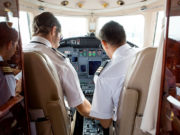U.S. air carriers will be required to provide their pilots with additional training as part of a government-mandated effort to “mitigate incidents of unprofessional pilot behavior and reduce pilot errors that can lead to a catastrophic event,” the U.S. Federal Aviation Administration (FAA) says.
In a final rule published Monday in the Federal Register, the FAA said that air carriers that conduct domestic, flag and supplemental operations will be required to “enhance the professional development” of their pilots by giving newly hired pilots opportunities to observe flight operations and learn about procedures before they assume pilot duties.
In addition, the rule calls for carriers to revise the curriculum for pilots who are upgrading and to provide all pilots-in-command with training in leadership and command, and in mentoring. Compliance dates are in 2022 and 2023 for all U.S. Federal Aviation Regulations Part 121 air carriers. Some commuter, on-demand and fractional operations conducted under Parts 135 and 91 also will be required to comply.
The FAA initially proposed the changes in October 2016 in the aftermath of a handful of crashes in which pilots did not comply with standard operating procedures (SOPs) such as the sterile flight deck rule, which prohibits “nonessential duties,” including nonessential conversation, during critical phases of flight.
The rule cited reports by the U.S. National Transportation Safety Board (NTSB) on two accidents that occurred years earlier and that prompted the U.S. Congress to pass legislation calling on the FAA to change pilot training rules.
The two accidents were the Oct. 14, 2004, crash of a Pinnacle Airlines Bombardier CRJ-200 in Jefferson City, Missouri, and the Feb. 12, 2009, crash of a Colgan Air Bombardier Q-400 near Buffalo, New York.
In the Pinnacle crash, both pilots — the only people in the airplane — were killed. The NTSB said the probable causes of the accident included the pilots’ “unprofessional behavior, deviation from SOP and poor airmanship, which resulted in an in-flight emergency from which the pilots were unable to recover, in part because of their inadequate training.”
In the Colgan crash, which killed all 49 passengers and crew along with one person on the ground, the NTSB cited, among other things, the pilots’ failure to monitor airspeed and their “failure to adhere to sterile flight deck procedures.”
